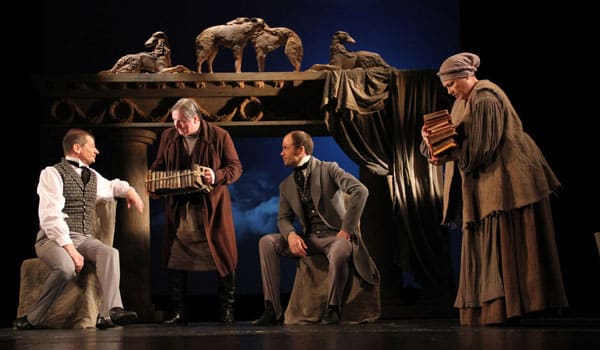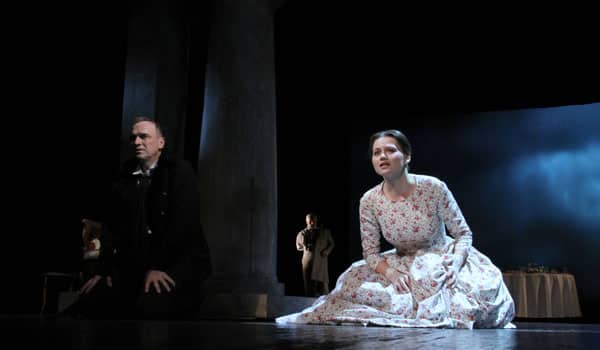The Ward Of The Manor
St James Theatre
09/09/15
4 Stars
‘People are drinking tea while their hearts are breaking.’ – Chekhov
The Lesya Ukrainka Theatre is currently in residence at the St James Theatre with an intriguing programme of Turgenev and Chekhov and other writers. While the whole project is sponsored by the Ukrainian Ministry of Culture potential theatre-goers can rest assured that this festival stands apart from the current backcloth of the disastrous conflict in the Donbass region. In fact it acts as an eloquent reminder of the former close cultural collaboration between Ukraine and Russia and how that stands as another casualty of the current civil war. There is a long tradition of performance of classic Russian-language theatre in Ukraine that dates back to Stanislavski, and one of the great rewards of this current residency is to see how rich that dramatic tradition still remains.
This opening play in their season is better known in English translation as Fortune’s Fool, written in 1848, and therefore slightly pre-dating A Month in the Country. Perhaps it is a more helpful way of placing it to say that it belongs to the world of his first real success, Sketches from a Hunter’s Album (1852), a series of short stories offering keen, tragi-comic observation on episodes and characters from rural life. It is a long one-act play, running for two hours, with two main scenes. There is no interval, though in this case, with the extra concentration needed for an original language performance with dubbed recording, a short interval would have been welcome.
The action is set on a large ramshackle landed estate similar to the one on which Turgenev grew up and which he later inherited. The lively young owner and heiress, Olga Petrovna, has just returned home after spending the first seven years of her marriage in Moscow. A gallery of stock household characters, whom we all know from Chekhov, set the scene. Her husband, Yeletsky, a stuffy government official, rather older than herself, throws a party to mark their homecoming to which all the neighbours are invited. This party takes up most of the first scene as it degenerates toast by toast into a macho brutal bullying game with grim consequences for all concerned.
At the centre of this is Kuzovkin, the ‘ward of the manor’, one of those talented men of ambiguous social status who crop up regularly in Turgenev’s work. Neither a gentleman of independent means nor mere retainer, Kuzovkin is an elderly writer fallen on hard times who had hopes of inheritance now lost in an interminable legal dispute. He has stayed on at the estate after the death of Olga’s father, who was his friend and patron, and now understandably anxious about his uncertain future. One of the wealthy neighbours, a venomous dandy, Tropatchov, despises him purely for his poverty and goads him into a revelation about his own past that blows open the carefully calibrated social world of the estate. The second half of the play, which lacks the gripping tension of the first, is devoted to probing the meaning of that revelation and working out its implications for all of the characters, who have different things to hide and different acts of vengeance to take.
This play is by no means unfamiliar to us. There was a notable Chichester production in the 1990s starring Alan Bates that also travelled to Broadway; and more recently the Old Vic staged it with Iain Glen as Kuzovkin. But with the unfamiliar style of acting on offer here it certainly seems like a new play. There is a vigorous, sometimes physically manic style of delivery, which steers a thin line between the portrayal of tragic melancholy and the grotesque, slapstick antics of theatre of the absurd. This is a world away from the customary, more polite British playing of Russian repertory, which sometimes mistakes Chekhov for Rattigan, and just shows us the tea cups and not the broken hearts. At several points it was enough, indeed better, just to sit back, listen to the beautiful cadences of the spoken Russian, and let physical acting speak for itself.
There are essentially four main roles. As Kuzovkin, Viktor Aldoshin gave a full-on performance that was often as draining to watch as it must have been to give. He has to encompass a huge range of emotions from avuncular jollity at the beginning through to bitter, recriminatory, humiliated degradation at the end of the drinking scene, and a kind of visionary, escapist resignation at the end that enters the same mental world as the final pages of Uncle Vanya. His commitment to and inhabiting of the tortured psychology of his character was hugely impressive. As his vicious, foppish nemesis, Tropatchov, Viktor Saraikin took all the opportunities in the text for Iago-like temptation. It would be a mistake simply to play this role as a satire of a certain type of coarse, venal aristocrat who despises those less fortunate than himself. Much better, as here, to dig deeper: he is so successful as a troublemaker because he is truly psychologically perceptive and misuses his gifts to make social mayhem.
As the couple whose relationship is the focus of the second half, Yeletsky (Oleg Zamiatin) and Olga (Anna Artemenko) were very well matched – he, older, slightly pompous, and ill-prepared for social dislocation and uncomfortable revelations; she, girlish and elegant at the start but increasingly tough-minded once her own situation is put at risk. However, they were not so well served by the retrospective evocation of earlier family life embedded in the second scene which left them somewhat becalmed.
What impressed above all is the psychological complexity and physical bravura of the acting. Director Mikhail Reznikovich dedicated this production to the memory of his mentor Georgy Tovstonogov, for whom psychological realism was the talisman of truth in drama, and that legacy was certainly to be seen here. For those who wish to see what the freeing of the actor’s imagination and the pursuit of psychological truth can achieve in repertory that is often seen as purely a period curiosity, this really is a revelation, language barrier notwithstanding.
In a travelling production such as this there is not much scope for elaborate scenery and in any case there was little need for it. Instead we had a broad, draped arch in the classical style with a striking array of borzoi dogs on top: this served well as a basic division of zones upstage and down, and some indication of interior doorways. There was an array of stylish period furniture, a fine table of drinks and nibbles for the party scene and that was more than enough to suggest the appropriate ambience.
Any austerity in the setting was more than offset by the sumptuous period costumes for both men and women, the work of Maria Levitskaya. This success was not merely a matter of the fine tailoring and gorgeous materials, but also owed much to a careful and historically informed sense of social gradations, with the ranks of the participants well expressed through dress. In fact you could on one level read the whole story of the play in the faded, tattered array of ill-fitting garments given to Kuzovkin.
We are still too prone in the West to see the legacy of Stanislavski through the distortions of the Strasbergs’ Method Acting. But when we get the chance, as here, to see that full inherited tradition at work in materials that were central to the founder’s practice and intentions, it really makes you re-think the way Chekhov and his contemporaries should be handled in the theatre. The borderline between tragedy and farce, melancholic passivity and manic absurdist action is shown to be very narrow and unstable, and that can only be a good thing, the best way to ensure that a ‘classic’ stays fresh and avoids a patina of tame, safe respectability.


